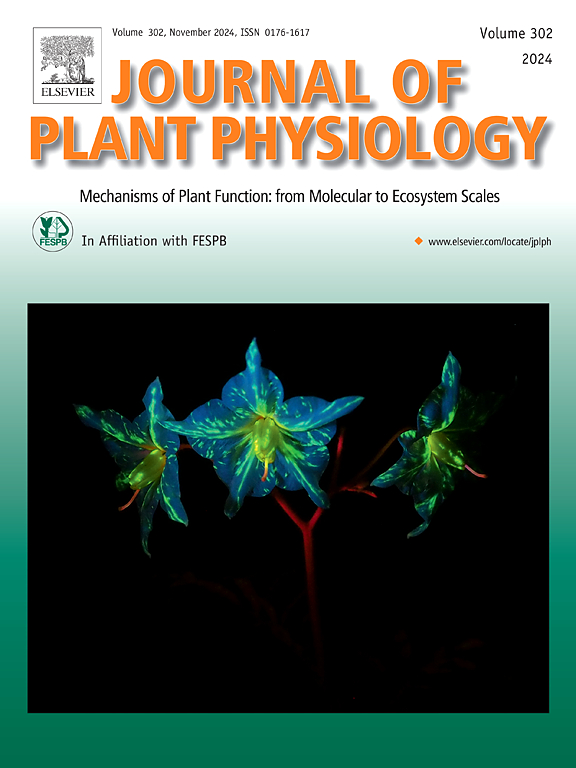Physio-biochemical and molecular analyses decipher distinct dehydration stress responses in contrasting genotypes of foxtail millet (Setaria italica L.)
IF 4.1
3区 生物学
Q1 PLANT SCIENCES
引用次数: 0
Abstract
Drought impairs plant growth and productivity by disrupting key physiological and biochemical processes. Foxtail millet (Setaria italica), a drought-resilient C4 crop, is well-suited for climate-smart agriculture, yet its stress adaptation mechanisms remain underexplored. This study deciphered dehydration responses in tolerant and sensitive genotypes, focusing on redox regulation, sugar metabolism, energy dynamics, and autophagy. For this, four drought-distinguished millet genotypes (2 tolerant and 2 sensitive) were subjected to dehydration stress (20 % PEG-6000) for different time points (0, 2, 6 and 12 h). Tolerant genotypes exhibited improved antioxidant enzyme activity and GSH:GSSG ratios, resulting in efficient detoxification of reactive oxygen species (ROS) and improved membrane stability. Sensitive genotypes, in contrast, accumulated ROS and showed elevated oxidative damage and electrolyte leakage. Tolerant genotypes also maintained higher trans-zeatin levels and suppressed chlorophyll degradation, thereby preserving photosynthesis and delaying senescence. Sugar metabolism was more efficient in tolerant types, with increased activities of sugar metabolism enzymes, enabling proper carbohydrate partitioning and osmotic adjustment. Contrastingly, sensitive genotypes showed sugar overaccumulation due to impaired mobilization. Also, tolerant genotypes retained higher ATP and pyruvate levels, indicating better energy homeostasis. Additionally, enhanced autophagy, marked by elevated ATG8 protein and ATG transcript levels, supported cellular recycling in tolerant genotypes. In contrast, repressed autophagy was observed despite increased abscisic acid in sensitive genotypes, likely due to sugar-mediated signalling and elevated trehalose-6-phosphate levels. These integrated responses highlight the roles of redox control, metabolic coordination, and autophagy in dehydration tolerance and offer multi-target strategies for breeding climate-resilient Setaria cultivars for drought-prone environments.
生理生化和分子分析揭示了不同基因型谷子(Setaria italica L.)不同的脱水胁迫反应
干旱通过破坏关键的生理生化过程来损害植物的生长和生产力。谷子(Setaria italica)是一种抗旱的C4作物,非常适合气候智能型农业,但其逆境适应机制仍未得到充分探索。这项研究破译了耐受和敏感基因型的脱水反应,重点是氧化还原调节、糖代谢、能量动力学和自噬。为此,在不同时间点(0、2、6和12 h),对4种干旱区分的谷子基因型(2种耐旱型和2种敏感型)进行脱水胁迫(20% PEG-6000)。耐受性基因型表现出更高的抗氧化酶活性和GSH:GSSG比值,从而提高活性氧(ROS)的解毒效率和膜稳定性。相比之下,敏感基因型则会积累ROS,并表现出氧化损伤和电解质泄漏升高。抗性基因型也保持较高的反式玉米素水平,抑制叶绿素降解,从而保持光合作用和延缓衰老。耐受性品种的糖代谢效率更高,糖代谢酶活性增加,能够进行适当的碳水化合物分配和渗透调节。相比之下,敏感基因型由于动员受损而表现出糖的过度积累。此外,耐受性基因型保留了更高的ATP和丙酮酸水平,表明更好的能量稳态。此外,自噬增强,以ATG8蛋白和ATG转录物水平升高为标志,支持耐受基因型的细胞循环。相比之下,尽管在敏感基因型中脱落酸增加,但自噬被抑制,这可能是由于糖介导的信号传导和海藻糖-6-磷酸水平升高。这些综合响应强调了氧化还原控制、代谢协调和自噬在脱水耐受性中的作用,并为在干旱易发环境中培育气候适应性强的尾草品种提供了多目标策略。
本文章由计算机程序翻译,如有差异,请以英文原文为准。
求助全文
约1分钟内获得全文
求助全文
来源期刊

Journal of plant physiology
生物-植物科学
CiteScore
7.20
自引率
4.70%
发文量
196
审稿时长
32 days
期刊介绍:
The Journal of Plant Physiology is a broad-spectrum journal that welcomes high-quality submissions in all major areas of plant physiology, including plant biochemistry, functional biotechnology, computational and synthetic plant biology, growth and development, photosynthesis and respiration, transport and translocation, plant-microbe interactions, biotic and abiotic stress. Studies are welcome at all levels of integration ranging from molecules and cells to organisms and their environments and are expected to use state-of-the-art methodologies. Pure gene expression studies are not within the focus of our journal. To be considered for publication, papers must significantly contribute to the mechanistic understanding of physiological processes, and not be merely descriptive, or confirmatory of previous results. We encourage the submission of papers that explore the physiology of non-model as well as accepted model species and those that bridge basic and applied research. For instance, studies on agricultural plants that show new physiological mechanisms to improve agricultural efficiency are welcome. Studies performed under uncontrolled situations (e.g. field conditions) not providing mechanistic insight will not be considered for publication.
The Journal of Plant Physiology publishes several types of articles: Original Research Articles, Reviews, Perspectives Articles, and Short Communications. Reviews and Perspectives will be solicited by the Editors; unsolicited reviews are also welcome but only from authors with a strong track record in the field of the review. Original research papers comprise the majority of published contributions.
 求助内容:
求助内容: 应助结果提醒方式:
应助结果提醒方式:


